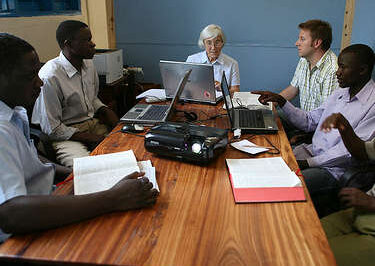Mart Green, is backing a cooperative effort to
digitize Bible content and speed up the translation process

businessman whose family’s $70 million gift lifted Oral Roberts University
(ORU) out of debt is backing a cooperative effort to digitize Bible content and
speed the pace at which translations are completed.
Every Tribe
Every Nation plans to initially put 160 existing texts into digital format,
although Mart Green said the process for converting several thousand will
likely take 20 to 25 years.
“This is
driven by the sense of urgency in several areas,” said Green, who became
chairman of ORU’s board of trustees three years ago after helping the school
pay off $54 million in debt. “What’s front and center for me right now would be
mobile. Every hour 1,000 people are downloading the Bible onto their iPhone.”
Although no
formal announcement of the initiative was planned, in mid-November Green
presented the vision to trustees of the American Bible Society (ABS). The other
two major partners are Biblica (formerly the International Bible Society) and
Wycliffe Bible Translators (including partners within its affiliates, The Seed
Company and SIL International). The trio accounts for 90 percent of completed
and developing translations.
Because
meetings were planned in recent weeks with major donors, the budget and
specific plans were still being finalized at year-end. Green said the estimated
cost for the first two years will be $16.5 million.
Robert Briggs,
executive vice president of ABS’ Global Scripture Ministries, said the
first phase would also stimulate production of additional translations. They
will be made available in digital formats for distribution by cell phone and
other electronic delivery.
“This is a
project that has a scale that can change the pace and direction of our
translation work and outreach to these unreached people groups,” Briggs said.
Green, chairman of the
Oklahoma City-based Mardel
Christian and Educational Supply
chain of retail bookstores, said the inspiration for Every
Tribe Every Nation goes back to 1998.
That year, he attended the annual
meeting of the North American Forum of Bible Agencies,
a consortium of about two-dozen ministries, many involved in Bible translation
and distribution.
The association eventually led to
Green producing End of the Spear. The 2006 film dramatized the story of five missionaries who were killed in 1956 during their
attempt to evangelize a tribe in the jungles of Ecuador.
It also
caused him to envision the day when a project would develop that was so huge it
would prompt various ministries to work cooperatively, and donors who could
help finance it.
“I assume
we’re like a lot of donors—we give to this ministry and that ministry,” Green
said. “But we’ve never come together with several donors to say, ‘This project
is too big for me, but all these ministries are working together. As a donor
you should like that because you don’t want too many ministries doing the same
thing.’”
Briggs
credits Green’s involvement with moving the idea from concept to reality.
“He came to
the Bible Society one day and presented us and other Bible agencies with a
challenge,” Briggs said.
“He said, ‘If you people would
considerable collaborating more effectively than you have in the past and work
together on this challenge of getting God’s Word to every tribe … on the
planet, I would consider working with you and providing the funding to help get
this work done.”
Green recalled that some
representatives of these ministries pointed out that putting translations in
digital form would take considerable monetary investments and human resources.
However, he argued they owned the rights to those translations.
“I said, ‘You should get it done;
it’s your intellectual property,’” Green said. “‘What if we, the donors, helped
you do that?’”
The
initiative will help boost Vision 2025, a goal adopted
by Wycliffe and other agencies in 1999 to start translation work among every
language group in the world by the year 2025.
While
completing this digital revolution could cost up to $600 million, Green said
the agencies couldn’t process that kind of funding immediately, which is why it
could take more than two decades.
Part of the
initiative’s purpose will be to set a list of priorities for people groups
needing a translation and completed versions transferred into digital formats,
Green said.
“If you’re
a mobile phone guy, you want German, Spanish [and other] large languages,” he
said. “Obviously, those would be ones donors would want to get done. Now we’re
doing lots of new languages. It would be great for us to digitize the ones we
want.”







Leave a Comment
You must be logged in to post a comment.